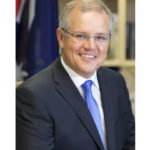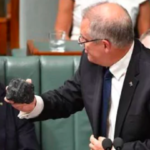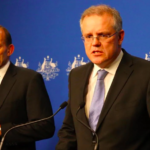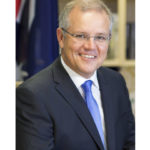Morrison’s Ransacked Australia: Time to Turf Him Before It Goes Further

In Morrison’s Australia, if you have a go, you get a fair go. It’s the type of nation where even a thug in an expensive suit can grapple their way to the top of the heap if they come from a privileged enough background and don’t take the “fair” part of the equation quite too seriously.
Under the PM’s oversight Australia takes the most desperate people on the planet. Those who’ve risked their lives in rickety boats to plead for help from the globe’s wealthiest – a right guaranteed under international law – and then imprisons them illegally offshore for being too dark-skinned.
During the last years of Morrison’ rule, extreme weather events have become common, whether that be great swathes of forest burning down or towns flooded out of existence, and his response to those who have been trying for a fair go is to just get used to it being a harder place to live.
But, according to the guy who turned back the boats, most “quiet Australians” are just content to get on with their lives, keep their heads down and work hard, rather than pay too much attention to the running of the country, despite the fact their children will never have the advantage of a fair go.
Indeed, perhaps the greatest effect Scott Morrison has had is to make it so obvious to the constituency that government in its present form doesn’t represent it but rather is captured by corporations, that the public, shaken by the last three years, may start to look beyond the majors.
Different strokes
The Morrison government is the type of employer that treats its employees in an eclectic manner.
If, say, you’re a young female staffer who is sexually assaulted in the office of the minister you work for, they’re likely to ask you to come back to the scene of the crime to discuss what happened, before attempting to sweep it all under the rug.
However, if you’re a senior minister, say, the attorney general, and a detailed report of an historic rape allegation is presented to the prime minister by the victim, Morrison would likely simply toss the document aside and shift the alleged rapist to another ministerial role.
These scenarios that actually transpired horrified women nationally, along with a deluge of other sexual harassment allegations that followed, and when thousands turned up to protest at federal parliament, Morrison said they were lucky they weren’t “met with bullets” like in other countries.
Then there’s the case of former education minister Alan Tudge who stood down last December following allegations of an abusive extramarital affair with a staffer. Yet, just this week, Morrison announced that Tudge is technically still a part of the cabinet and will remain so after the election.
The creeping surveillance state
The Coalition hasn’t progressed to the point of rolling out laws to shoot down protesters as yet. However, under Morrison’s watch, some of our most draconian surveillance laws have been enacted, mainly due to his close colleague, who’s stinging to stab the PM in the back, Peter Dutton.
As home affairs minister, Dutton didn’t begin the process of creating the surveillance state, as that was then PM John Howard’s handywork post-9/11.
But what the former cop has managed to do is roll out a number of frameworks, which include not only allow law enforcement and spies to hack into electronic devices and online accounts, but he provided them with the ability to add, copy, delete or alter data contained on them.
These are just some of the examples of the far-reaching national security laws the Morrison government has passed over the last three years, which are said to target terrorists and paedophiles, but are actually incrementally eroding the rights of all citizens and residents.
And the reason these laws are able to provide such reach is Australia is the only liberal democracy without some legislation guaranteeing citizens’ basic rights and liberties in federal law, so lawmakers are free from having to address any imposition their legislated provisions might make upon them.
Major parties don’t pass a human rights act because it would mean their power would be curbed, which is the same reason why Morrison, having promised an anticorruption body, failed to deliver on it, as not only would it stymie his government’s power, but it would more so criminalise it.
And whilst Dutton has moved on to even more destructive pastures, new home affairs minister Karen Andrews has just passed her first Orwellian national security laws, which have basically provided key foreign intelligence agencies with a broad reach to spy on Australians domestically.
War anybody?
Dutton’s new duty is defence. He and Morrison have Beijing in their sights. It all commenced with the PM puffing his chest up about an inquiry into the Chinese COVID outbreak in late 2020, and by last May, the new defence minister announced we’re already on something of a war footing.
It’s no secret that the US is the key player itching to take on China. But for some reason Morrison and Dutton have been designated the role of chief protagonists when it comes to making hostile remarks about the Chinese Communist Party.
Morrison announced last September that Australia has become a part of the AUKUS pact, which includes the US and the UK, due to changing security circumstances in the Indo-Pacific, meaning China. And our PM also decided we’d be going nuclear in the form of submarines at the same time.
While Dutton announced in November that “it would be inconceivable” for our country not to follow Washington into war against China if Beijing decided to take action against Taiwan. The defence minister said, “war would be devastating”, even conventional war, “let alone a nuclear war”.
The house is burning down
But as all Australians are realising, having a go while the locality they’re living in is either burning to the ground or being swept away by floods, doesn’t mean you get a fair go. It actually means your livelihood is taken away and the government is unable or unprepared to do anything to prevent it.
The prolonged and widespread bushfires of 2019/20 were like nothing the country had seen before. And while it was well understood the ferocity was due to changing climate driven by fossil fuel use, Morrison announced a massive expansion of the gas industry just six months later.
Then, when called upon to front up to the COP26 with a plan to curb Australia’s carbon emissions, the PM delivered a brochure with no real details, but it did include a statement that part of our strategy will be to wait for future technologies to be developed to solve the problem.
And now that the floods have destroyed entire towns on the eastern seaboard, Morrison’s key concern is not about how he’s going to help “quiet Australians”, but rather it’s on how he’s going to downplay that the actions of the fossil fuel industry have been causing their extreme nature.
Forge change or burn in Pentecostal hell
Morrison’s running scared at the moment because keeping a lid on all of this deceit and corrupt profiteering is becoming impossible.
So, the climate defenders are escalating their actions to try and break the authorities’ inaction. And the NSW government’s response to this has been to enact some of the most draconian anti-protest laws in any liberal democracy worldwide.
Extreme laws like these are often tried and tested in NSW before being rolled out nationally.
But there’s a lot of bipartisanship in the way that all this is playing out. And while a Labor government won’t be as antidemocratic as the Coalition in its actions or appearance, it will keep the ship heading in the same steady direction right off the edge of the planet.
And as many are now realising, with a likely minority Labor government and a strong crossbench of progressive minor party and independent candidates – and there’s a hell of a lot of them contending – the boat could slowly start being steered off its current trajectory back to a land of plenty.
So, it’s time to ditch the majors and vote for the progressives.
The alternative? Well, in some more authoritarian parts of the planet they shoot climate defenders in the head, rather than sending them to prison as is becoming an increasingly common practice here.







